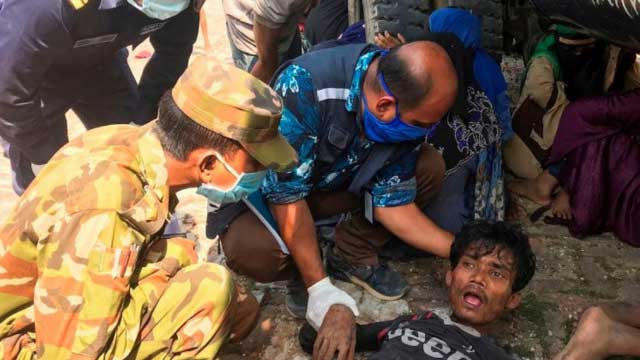The ink was barely dry on a statement by Southeast Asian governments pledging to leave "no one behind" in the coronavirus pandemic when reports of hundreds of Rohingya refugees adrift in the Andaman Sea emerged in early April.
But instead of showing solidarity, the countries demurred on sending out search and rescue missions or granting access. When one of the boats approached Malaysia hoping to land, the navy pushed it back—giving the desperate passengers food but refusing to tow them to land. The boats lingered at sea for two months before nearly 400 emaciated refugees were rescued by Bangladesh on April 15. Another boat with almost 300 Rohingyas languished in Bangladeshi waters for weeks before its navy reluctantly rescued them on May 7. Calls by Dhaka for more support from Southeast Asia have fallen on deaf ears. In the meantime, pushed out by the ongoing persecution and violence in Myanmar and hardship in the Bangladeshi camps, the Muslim minority continues to flee by boat.
The Malaysian government points to the coronavirus threat as justification for turning the refugees away. Bangladesh is asking why it should again be its job to come to the Rohingyas' rescue, calling for Western countries to act instead of chastising others. But while people are starving, there is no time for whataboutism. Human rights organizations have called the refusal to help a "death sentence" that might turn the Andaman Sea into a "graveyard."
Such repudiations are not new for the Rohingya or for other victims of human rights violations in Southeast Asia. Among states where human rights abuses are rife, resources often scarce, and the principle of noninterference reigns, governments can count on one another to look the other way when needed.
Branded as illegal immigrants by the Myanmar government despite being born in Myanmar, the Muslim minority has faced brutal violence and discrimination for years. Rohingyas have fled Myanmar by the hundreds of thousands after being stripped of their rights, confined to camps, and worse. Nearly a million now live in refugee camps in Bangladesh's Cox's Bazar, the vast majority of whom arrived after a brutal August 2017 military campaign by Myanmar's army, described as genocide by the United Nations.
Each year before monsoon season, hundreds or thousands escape by sea, paying vast sums of money to smugglers to leave Myanmar. The journey has always carried deep risks, from the tumultuous waters to the traffickers themselves, who have held refugees hostage while extorting more money from their families. In the summer of 2015, when a Thai army general was arrested for running trafficking camps on the Thailand-Malaysia border, traffickers rapidly abandoned their human cargo, and hundreds died at sea. But the trafficking never stopped. This February, shrouded corpses were lined up by the shore in Bangladesh after a trawler carrying more than 100 Rohingyas capsized. More boats may meet the same fate as Southeast Asian nations turn further inward, citing coronavirus pressure.
UN High Commissioner for Human Rights Michelle Bachelet warned of a "human tragedy of terrible proportions." The UN estimates there are still hundreds of Rohingya men, women, and children left in potentially deadly limbo in the Andaman Sea.
An idea of the conditions on these boats was given in mid-April as some 400 emaciated Rohingyas, many not more than skin and bone, staggered onto the shore after being rescued from a trafficking boat. Several dozen on the same boat died at sea. On May 7, a boat with 280 Rohingyas originally bound for Malaysia was finally let ashore in Bangladesh after a weekslong standoff. The asylum-seekers were brought straight to an island hours from the refugee camps at Cox's Bazar, opposed by aid groups for its unlivable conditions.
The world has relied on Bangladesh to host Rohingya refugees for years. Efforts to repatriate them to Myanmar have hit a wall, with the government refusing to meet the minimum guarantees for their safe return. In turn, Dhaka has put pressure on the refugees themselves. The government has restricted the ability for Rohingyas to work, buy SIM cards, learn the local language, or move freely and has started to build barbed wire fences around the camps. After years of persecution, a small civil society emerged in the camps, only to be cracked down on. Internet access has been restricted since June 2019.
Southeast Asian governments, meanwhile, have long been silent about holding Myanmar—the root cause of all the Rohingyas' suffering—accountable for its crimes. It was Gambia, a small Muslim-majority country, that made the important step last year of taking Myanmar to the International Court of Justice in The Hague.
If the moral compass of the Southeast Asian nations fails to compel them to save Rohingya lives, international law should. Under the principle of non-refoulement, states are prohibited from pushing back anyone at risk of persecution, obligating them to let the refugees ashore instead. The Human Rights Declaration of the Association of Southeast Asian Nations (ASEAN), meanwhile, includes the right to seek and receive asylum. As long as ASEAN shirks these responsibilities, needless suffering will continue.
"We only survive here" is something Rohingyas have repeatedly told me while reporting from the refugee camps over the years. The world doesn't even seem to grant them this right, let alone the chance to strive for something better.-Foreign Policy





